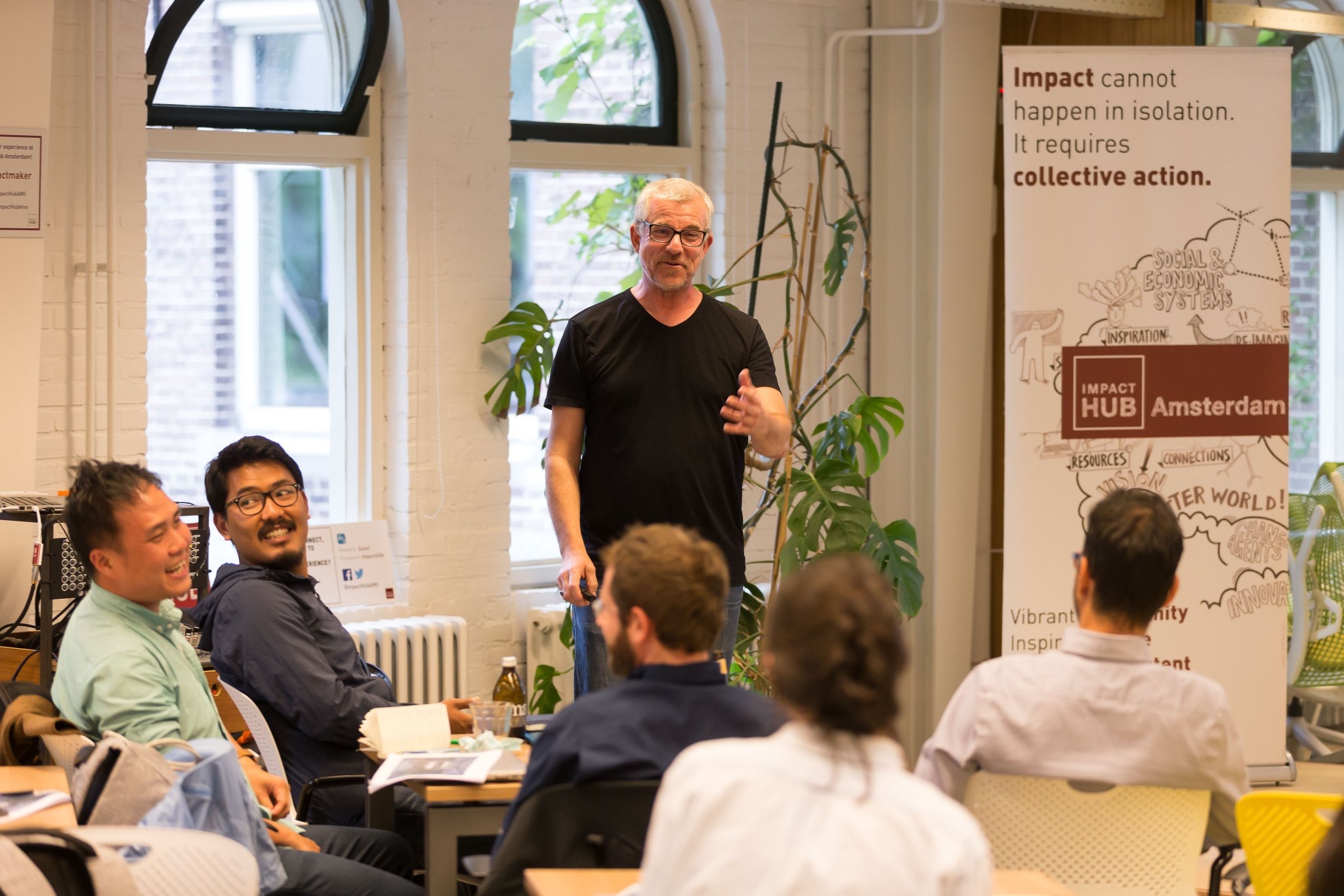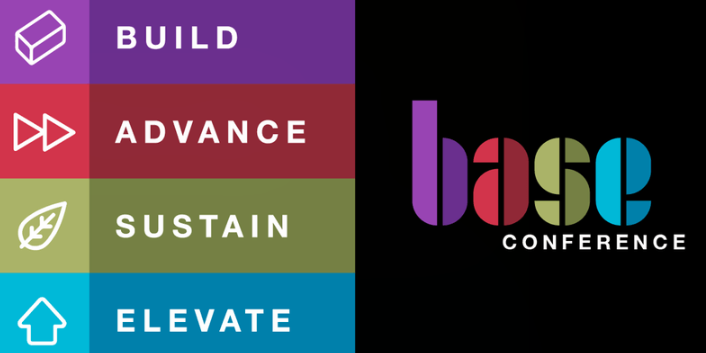David Beckett
Public speaker
Pitch Coach “Best 3 minutes presentation”
Senior Pitch Coach at StartupBootcamp
ABOUT BASE CONFERENCE AND YOUR OWN BUSINESS
You are a keynote speaker at BASE Conference. What are you going to talk about?
I’m going to talk about how to pitch yourself, your ideas and your business, and build a story that you believe in and can tell with confidence.
You were executive before helping start-ups. What is your story, how did you find your passion and your path to teach “pitching” to start-ups? How was “your jump” into freelance work?
I worked – very happily – for Canon for 16 years, and moved up to Director level. However, in the last two years I felt like I wanted to hit the reset button on my personal and professional life. That opportunity came when my job (along with 233 others) moved to London 10 years ago. I then spent a turbulent five years, having five jobs and getting fired from two of them.
After these failures, I decided to go back to my passions. I loved coaching people as a manager at Canon, and I have been fascinated for my whole work life by how presentation can make such an impact on people’s professional lives. I decided to pursue this as a career, and luckily got connected with Startupbootcamp back in 2013. I learned that helping people deal with the time-pressure of a pitch combined perfectly with those other passions.
Being a freelancer has been a process. I work more hours than IU did at Canon (and I worked a lot of weekends and evenings then!) but I do it more flexibly. If my kids have a school event on a Tuesday afternoon, I plan my work and take the time off – this would not have been possible in the old job. Equally, the work never stops it seems! Coaching by day, creating content and doing the admin stuff after the kids are in bed. But it suits me and I love the work.
How is your executive corporate, English literature and marketing background helping you in your current career?
Working in a large company helps you manage the basics of business – financials, product planning and working with people from around the world – I did business in 41 countries for Canon. English Literature? Well, in a way writing an essay is a presentation – gathering your material, organising your thoughts and presenting them in a coherent argument to convince the reader of something. Marketing at Canon helped me understand the power of the brand.
However, I had very few of the skills I developed in the last 6 years when I left Canon – running a workshop, 1:1 coaching, creating a video, creating an online academy, writing and designing books, editing copy, designing my own brochures, managing my own website etc…
“Sharing failures and learnings can be a powerful message because people don’t believe perfection”
You are the author of several books; “Three Minute Presentation”, “Amsterdam… The Essence” and publisher of “White Phosphorus”. How did you get inspiration for your books? How did you differentiate between the roles of author and publisher?
For years while working at Canon, I had been saying, ‘If only I had time to write a book.’ Then I got laid off, with a payoff of 12 months – suddenly, I had time! So either you do it or stop saying it.
I knew I wanted to write about something I love, and Amsterdam was the obvious subject. I hit on the idea of interviews with well known and unknown Amsterdamers, with the theme – how are you special for Amsterdam, and how is Amsterdam special for you? Through writing this book, I met my wife at a Writers’ Group, and through the interview with DefP (the originator of Dutch Rap) I decided to talk to my wife about having children. We now have a 6-year old daughter and a 4-year old son, so that book literally changed my life!
Three Minute Presentation was based on another passion, and I felt like – I’ve written something people will like, now let’s write something they need! And without that book, I wouldn’t have a business today.
White Phosphorus is a book of poetry by Amsterdam’s anonymous street artist, Laser 3,14. When I left Canon, I showed one of his tags at my farewell party, with the words ‘What use these wings, if they refuse to fly?’ I felt at that time I had something more inside me. Four years later, I was sitting with my hero of those words, doing final edits of his book, which I published, I had met Laser through “Amsterdam… The Essence”, and was honoured and delighted to work with him on this amazing book.
“First, don’t open PowerPoint! Do that later. Get some things clear first”
ABOUT ENTREPRENEURSHIP
As a pitch coach, What is your advice for start-ups and idea-owners to structure their pitch?
First, don’t open PowerPoint! Do that later. Get some things clear first: who’s the audience you’re pitching to and what do they care about? What’s the objective – what do you want these people to do as a result of the pitch.
Next, get the story straight by using Post-Its to brainstorm the pitch. I created The Pitch Canvas© as a free tool to help Start-ups to brainstorm on the topics that investors and board members are interested in (free to download at Best3minutes.com)
Then start to verbalise the pitch – say things out loud, get feedback from colleagues, before really defining the storyline. Have a strong opening and closing, and don’t over-explain.
Then create slides that support the story – with images, icons and minimal text. Finally – practice like crazy! Everyone can make a good professional pitch – it’s just about the level of work you want to do. Another free tool will support in this process best3minutes.com/help.
TEDxSpeech are well know and create the message of being strong, great. But we are all humans, how would vulnerability fit in this picture? Is okay to talk more from an emotional perspective?
It’s more than OK – it’s essential! The best pitches have rational content – problem, solution, traction, what’s unique etc – combined with non-rational stuff. Why are you committed to solve this problem? Why do you think this is a great proposition – for your customers, for investors? We think everything needs to be perfect, but sharing failures and learnings can be a powerful message because people don’t believe perfection. It is much more relatable to share both rational stuff – product, traction, market size etc – and the more personal edge.
How do you use TED to great more awareness for and understanding of innovation? What is the difference between innovation and entrepreneurship from your perspective?
Firstly, TEDx Amsterdam has an Award every year – which I’ve coached on for the past five years – which supports environmental and social startups to share their story. TEDx talks have brought awareness of important issues – such as the dangers of data abuse, in Carole Cadwalladr’s amazing talk, ow why Startups succeed and fail – that need to be shared with millions.
And regarding the difference between Innovation and Entrepreneurship – that’s actually a huge topic! But in short, I think Innovation is about ideas, creating new ways of doing things, creating new tools – and entrepreneurship is the interface with customers. Talking with customers to improve the innovation, and building a team to grow and bring innovation to a wider audience. And of course, a critical part of entrepreneurship is sharing and selling the story, to build a following and word of mouth – and that’s where the pitch comes in!
“TEDx talk is about sharing a timeless concept that you have spent a big part of your life working on”
What do you believe is important to have as skills to one be a TED speaker and two control innovative ideas and turn them into reality?
Being a TED speaker is all about having an idea worth spreading, for selfless reasons. I have had people ask me – ‘I’ve written a book, how can I get a TEDx talk to promote it?’ This is not about selling products, a TEDx talk is about sharing a timeless concept that you have spent a big part of your life working on.
Taking Innovative ideas and turning them into reality is a combination of so-called hard and soft skills. The hard skills: implementing Lean Startup, getting connected with customers and testing ideas and product concepts, building a team of believers, and a crowd of supporters with your communication and pitch. The soft skills: a never-ending wish to learn, resilience to deal with setbacks and a true never-give-up attitude. It all comes down to one basic thing – focus on solving the problem, and everything it takes to do that.
How do you cope with stress and nerves, personally? Do you have nerves sometimes, as a coach, when preparing for a session?
These days not so much, but I also do moderation of events because I find that scary, and I want to feel nerves in the same way as my clients. The best tool to manage nerves is to memorise the first 60 seconds so that you have a solid and strong platform for the pitch, talk or training and there is a guarantee of success at the opening.
“There is a lot of logic in the – ‘Get up at 5 am, meditate, drink a smoothie…’ – trend but for most people, this is not real life for many people”
ABOUT LIFE
How do your mornings look like?
Haha, not like that bloke from Twitter! They look like – find clothes for the kids (they are 6 and 4 years old), make their lunch, sit and have breakfast with my wife and the kids, try to get them to clean their teeth properly and take them to school. There is a lot of logic in the – ‘Get up at 5 am, meditate, drink a smoothie…’ – trend but for most people, this is not real life for many people.
What’s the best music you have ever listened?
I am a massive sucker for Rocky films, so, yes, I listen to the Rocky theme tune a lot. My favourite song ever is War Baby by Tom Robinson.
What are you doing in your spare time and weekends?
See above answer about my mornings! Largely it is about spending time with the kids. I started a family at a late age, and I am committed to my family. So my wife and I are mostly spending time with them, and I go to the gym or for a run on Sunday mornings.
Books recommended by David Beckett:
On 29th of May 2019, the first BASE conference will be held in Amsterdam, The Netherlands. BASE stands for Build, Advance, Sustain, Elevate and it is their mission is to create an exclusive, boutique conference that helps and supports startups and SMEs to gain the knowledge needed to scale up while building connections and getting inspired by experts in the field. We have a special discount price of 50% for KNOWCO members. Please enter (CODE KnowCo50) when you buy your tickets here.
Read more about David Beckett’s Golden Rules for Living, here.










